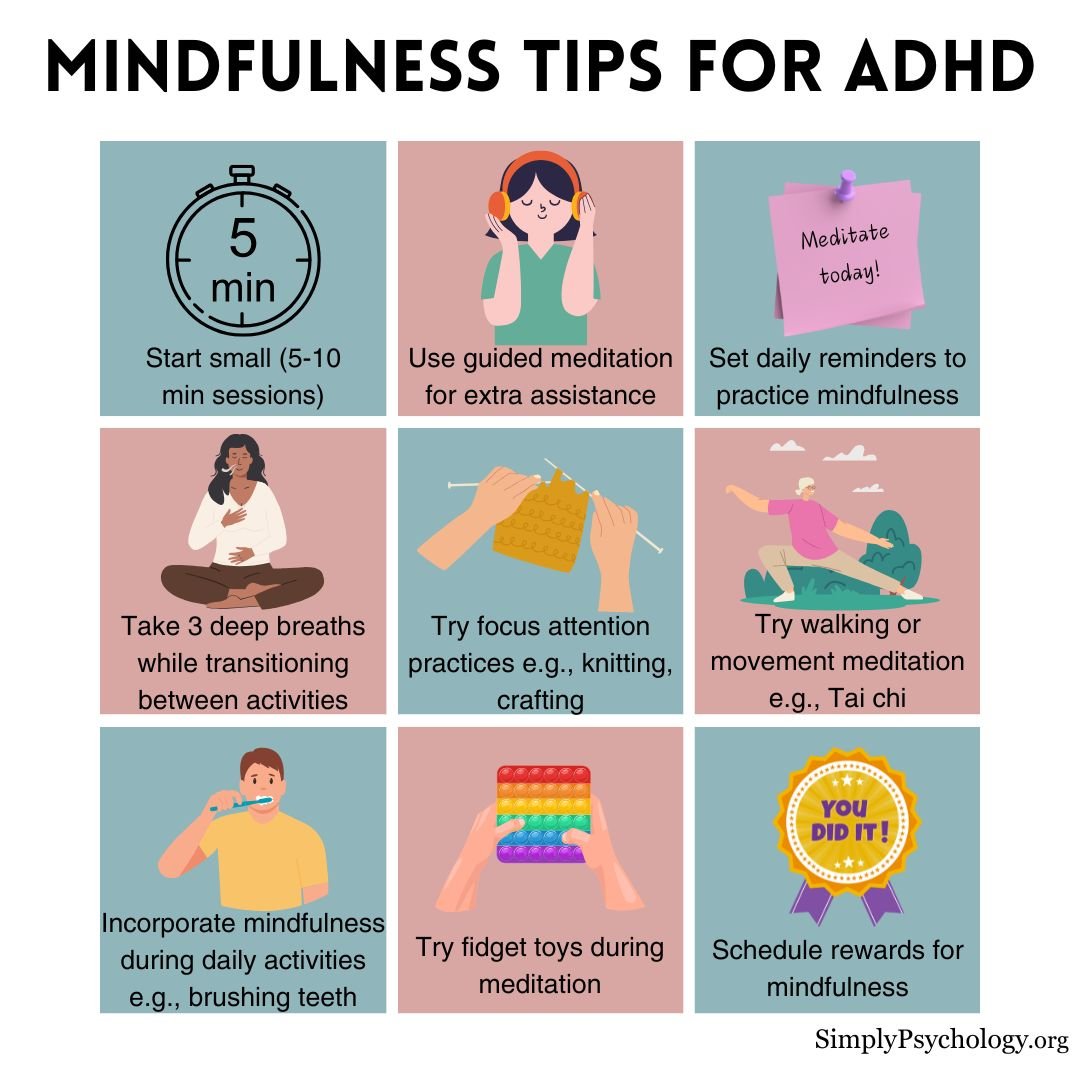Mindfulness meditation can improve life for people with ADHD by specifically training attention and emotional control, which are core challenges in ADHD.
Though more evidence is still needed, this affordable, accessible therapy empowers individuals with ADHD to improve their own functioning.
Core symptoms like difficulty sustaining attention, distractibility, restlessness, and acting without thinking can significantly impact school, work, relationships, and more.

By training present-moment awareness, mindfulness enables people to focus better, think before acting, and manage unhelpful impulses.
Because of this, it is possible that mindfulness could be a useful method for managing the key symptoms of ADHD.
Mindfulness shows promise as a supplemental ADHD treatment; yet further neuropsychological studies are necessary for conclusive results.
This article explores the science behind using mindfulness strategies to mitigate ADHD symptoms.
How Effective Is Mindfulness for Managing ADHD Symptoms?
While mindfulness clearly benefits attention in ADHD, its specific mechanisms and long-term impact on daily life deserve deeper exploration.
Multiple studies have found that mindfulness meditation can lead to improved attention and concentration in both children and adults with ADHD.
For example, one meta-analysis showed a moderate-to-large effect size for reductions in parent- and teacher-rated inattentive symptoms following mindfulness programs for children with ADHD.
Research in adults has also indicated that mindfulness may decrease self- and clinician-rated symptoms of inattention.
There is less consistent evidence regarding the effects of mindfulness on hyperactivity and impulsivity. While some studies have found reductions in hyperactive/impulsive symptoms as well, others have only seen significant improvements in the inattentive domain. This aligns with findings that mindfulness specifically targets attention networks in the brain.
Beyond core ADHD symptoms, mindfulness interventions may also positively impact executive functioning, like inhibition, working memory, and cognitive flexibility.
Preliminary research shows participants report some improvements in these areas of self-regulation. However, more objective neuropsychological measures have had mixed results, indicating a need for further study.
Research suggests mindfulness could additionally help reduce commonly co-occurring difficulties for people with ADHD, like anxiety and depression.
Multiple trials demonstrate decreased depressive symptoms, and one meta-analysis confirmed this effect specifically in adults.
Mindfulness Practices That Could Help Someone With ADHD
Below are some types of mindfulness practices that can help manage ADHD:
| Technique | Description | Best For |
|---|---|---|
| Body Scans | Slowly focus attention on each part of your body, from toes upward, observing sensations non-judgmentally. | Improving bodily awareness and attention regulation. |
| Grounding | Shift attention to sensory experiences (sight, sound, touch) to quickly anchor yourself in the present moment. | Quickly managing distraction or overwhelm. |
| Focused Attention Meditation | Focus exclusively on one element, like your breathing. Gently return your attention whenever it wanders. | Building attentional control and reducing impulsivity. |
| Open Monitoring Meditation | Maintain a relaxed, open awareness without focusing on any specific thought or sensation. | Developing general awareness and reducing anxiety. |
| Walking Meditation | Walk naturally, paying close attention to physical sensations of movement and rhythm. | Individuals with hyperactivity who find it challenging to remain seated. |
| Mindfulness Apps (Headspace, Calm) | Use guided meditations structured for ease and regular practice. | Maintaining a consistent mindfulness routine. |
| Mindful Activities (Yoga, Tai Chi, knitting) | Engage in calming physical activities that promote focus and relaxation. | Those who struggle with traditional seated meditation. |
Practical Tips:
- Start small (5-10 minutes daily) and increase gradually.
- Practice regularly and patiently; mindfulness skills improve over time.
- Choose techniques aligned with your symptoms and lifestyle for best results.

How to Incorporate Mindfulness into Your Life
Here’s how you can start incorporating mindfulness into your daily life.:
Establish a Regular Mindfulness Practice
- Set aside 5-10 minutes each day to sit quietly and focus on your breathing. Use a timer or alarm so you don’t lose track of time.
- Try doing mindfulness while performing routine activities like brushing your teeth, washing dishes, or walking. Stay focused on the sensations and actions of the activity.
- Use mindfulness apps like Headspace and Calm which provide guided meditations. The structure can help people with ADHD maintain focus.
Practice Mindful Awareness Throughout the Day
- Notice when your mind wanders and gently bring your attention back to the present moment. Don’t judge yourself.
- Observe your thoughts, feelings, and bodily sensations with curiosity and acceptance.
- When doing activities, stay focused on what you are doing rather than multitasking.
Use Mindfulness for Emotion Regulation
- Take a few deep breaths when you notice frustration, anxiety, boredom, or other difficult emotions arising.
- Label your emotions in a non-judgmental way, e.g., “I’m feeling frustrated right now.”
- Imagine your thoughts and feelings as clouds passing by in the sky, existing separately from you.
Use a Technique That Works for You
- Many types of mindfulness meditation exist besides the stereotypical seated silent meditation. Moving meditations like walking, Tai Chi, or yoga can work well for those with ADHD who struggle to sit still.
- Find a type of mindfulness you can stick with consistently. Any form that relaxes you and trains your attention is helpful for ADHD.
- Focused attention practices like knitting, folding napkins, or counting beads can also calm and focus the ADHD brain.
Be Patient with Yourself
- Don’t expect to be able to meditate for long periods when starting out. Do what you can manage.
- If you get distracted or agitated during mindfulness, gently bring your attention back without self-criticism.
- Remember that building mindfulness skills takes regular practice over time. Don’t give up!
If mindfulness meditation increases anxiety or depression, it may not be advisable. Pay attention to whether you feel better after practicing. The key is finding what works for you and being patient and compassionate with yourself.

Limitations of Mindfulness for ADHD
Despite evidence that mindfulness can be beneficial for people with ADHD, it may not be the best management method for several reasons, as discussed below:
- As mindfulness requires sustained attention and concentration, which are areas of deficit in ADHD, some individuals may struggle to engage effectively in mindfulness practices due to inattention, distractibility or hyperactivity.
- The benefits of mindfulness rely on regular, daily practice, so establishing and maintaining a formal meditation routine can be challenging for those with executive functioning impairments common in ADHD, like poor organization skills and task initiation.
- Mindfulness promotes acceptance of the present moment rather than changing it, so for people who thrive on high stimulation and excitement, the non-judgmental observing aspect could seem boring and unsatisfying long-term.
- Sitting still during meditation can be very difficult for more hyperactive ADHD subtypes, so movement-based practices like yoga and walking meditation may be more suitable alternatives.
- There is a lack of conclusive evidence showing mindfulness improves more behavioral aspects of ADHD like impulsivity and hyperactivity, so individuals with predominantly hyperactive/impulsive symptoms may require other targeted treatments.
- The effects of mindfulness on core ADHD symptoms appear small to moderate based on current research, so more severe ADHD impairments may not improve to a clinically meaningful extent through mindfulness alone.
References
Cairncross, M., & Miller, C. J. (2020). The effectiveness of mindfulness-based therapies for ADHD: a meta-analytic review. Journal of attention disorders, 24(5), 627-643.
Evans, S., Ling, M., Hill, B., Rinehart, N., Austin, D., & Sciberras, E. (2018). Systematic review of meditation-based interventions for children with ADHD. European Child & Adolescent Psychiatry, 27, 9-27.
Hepark, S., Janssen, L., de Vries, A., Schoenberg, P. L., Donders, R., Kan, C. C., & Speckens, A. E. (2019). The efficacy of adapted MBCT on core symptoms and executive functioning in adults with ADHD: a preliminary randomized controlled trial. Journal of Attention Disorders, 23(4), 351-362.
Janssen, L., Kan, C. C., Carpentier, P. J., Sizoo, B., Hepark, S., Schellekens, M. P. J., & Speckens, A. E. M. (2018). Mindfulness-based cognitive therapy v. treatment as usual in adults with ADHD: A multicentre, single-blind, randomised controlled trial. Psychological Medicine, 49(1), 55–65. https://doi.org/10.1017/S0033291718000429
Janssen, L., de Vries, A. M., Hepark, S., & Speckens, A. E. M. (2020). The feasibility, effectiveness, and process of change of mindfulness-based cognitive therapy for adults with ADHD: A mixed-method pilot study. Journal of Attention Disorders, 24(6), 928–942.
Kretschmer, C. R., Göz Tebrizcik, B., & Dommett, E. J. (2022). Mindfulness Interventions for Attention Deficit Hyperactivity Disorder: A Systematic Review and Meta-Analysis. Psychiatry International, 3(4), 363-399.
López-Pinar, C., Martínez-Sanchís, S., Carbonell-Vayá, E., Sánchez-Meca, J., & Fenollar-Cortés, J. (2020). Efficacy of nonpharmacological treatments on comorbid internalizing symptoms of adults with attention-deficit/hyperactivity disorder: A meta-analytic review. Journal of Attention Disorders, 24(3), 456-478.
Lutz, A., Slagter, H. A., Rawlings, N. B., Francis, A. D., Greischar, L. L., & Davidson, R. J. (2009). Mental training enhances attentional stability: neural and behavioral evidence. Journal of Neuroscience, 29(42), 13418-13427.
Mak, C., Whittingham, K., Cunnington, R., & Boyd, R. N. (2018). Efficacy of mindfulness-based interventions for attention and executive function in children and adolescents—A systematic review. Mindfulness, 9, 59-78.
Poissant, H., Mendrek, A., Talbot, N., Khoury, B., & Nolan, J. (2019). Behavioral and cognitive impacts of mindfulness-based interventions on adults with attention-deficit hyperactivity disorder: A systematic review. Behavioural neurology, 2019.
Ramsay, J. R. (2021). Adult attention-deficit/hyperactivity disorder. In A. Wenzel (Ed.), Handbook of cognitive behavioral therapy: Applications (pp. 389–421). American Psychological Association. https://doi.org/10.1037/0000219-012
Ramsay, J. R. (2020). Cognitive interventions adapted to adult ADHD. In J. R. Ramsay, Rethinking adult ADHD: Helping clients turn intentions into actions (pp. 63–85). American Psychological Association. https://doi.org/10.1037/0000158-005
Vekety, B., Logemann, H. A., & Takacs, Z. K. (2021). The effect of mindfulness-based interventions on inattentive and hyperactive–impulsive behavior in childhood: A meta-analysis. International Journal of Behavioral Development, 45(2), 133-145.


